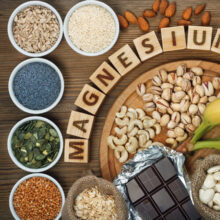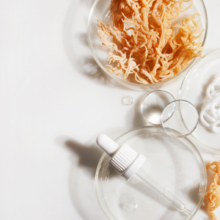Eat Your Water: Debunking the “8 Glasses of Water” Myth
- Published: Monday, March 5th 2012
- in Nutrition
By Howard Murad, M.D., FAAD
 We’ve all heard numerous times that we should drink eight glasses of water per day to maintain an optimal level of hydration, yet there is little scientific evidence for this advice, and for most people, more water just means more trips to the bathroom! Not only is this a waste of time and water, the constant flushing of water through your body can mean a loss of vital nutrients as well.
We’ve all heard numerous times that we should drink eight glasses of water per day to maintain an optimal level of hydration, yet there is little scientific evidence for this advice, and for most people, more water just means more trips to the bathroom! Not only is this a waste of time and water, the constant flushing of water through your body can mean a loss of vital nutrients as well.
Try something new: Eat your water and you won’t need to count your glasses. How? Just replace at least one glass of water a day with one serving of raw fruits or vegetables or water-rich foods.
This is not to say that water is bad for you. It is, in fact, essential for hydration and overall health. The goal is to strategically hydrate so that water is available to your cells throughout the day. Eating foods that are rich in structured water, especially raw fruits and vegetables, will not only help your body better optimize its water, but you’ll get the added boost of important antioxidants, fiber and other nutrients. By making food choices that include water-rich foods, you’ll end up eating most of the water needed each day to stay well hydrated, and that means less time in the bathroom.
Key Foods for Eating Your Water
Food: Cucumbers
Why Eat Them? Cucumbers are composed mostly of water and will keep you feeling hydrated longer. But, they are nutritious, too! Cucumbers are an excellent source of silica, a trace mineral that contributes to the strength of connective tissue, and the cucumber skin is a good source of Vitamins A, C and folic acid.
Why Eat Them? Pomegranates are a wonderful source of antioxidants, which help to combat free radicals, and may be the world’s most prolific source of polyphenols. The unique combination of elements in pomegranates increases the protective abilities of sunscreens (which can help prevent sun damage).
Food: Avocados
Why Eat Them? Avocados contain potassium, monosaturated fats and are very high in fiber. The monosaturated fats in avocados contain oleic acid, which has been found to improve fat levels in the body and help control diabetes and cholesterol.
Food: Apricots, Mangos
Why Eat Them? Apricots and mangos contain high amounts of Vitamin A. Vitamin A normalizes the production and life cycle of skin cells. In skin with acne, there is an overproduction of cells in the stratum corneum, which is the outermost layer of the skin and is composed of biologically “dead” cells. These excess dead cells combine with sebum (the skin’s own natural oil) to form comedones — the pore plugs that are the defining element of acne. Taken as a dietary supplement, Vitamin A helps to prevent overproduction of skin cells in the stratum corneum.
Food: Broccoli, Spinach
Why Eat Them? These green foods are a great source of Alpha Lipoic Acid (ALA), which is a potent fat-and-water-soluble antioxidant and anti-inflammatory.



